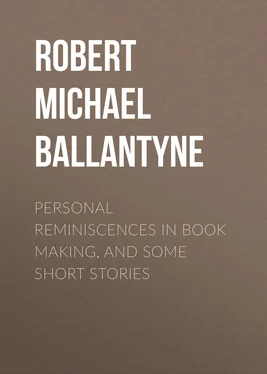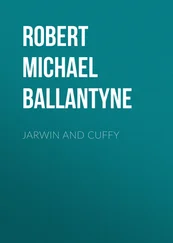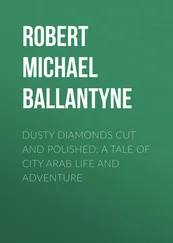Robert Michael Ballantyne - Personal Reminiscences in Book Making, and Some Short Stories
Здесь есть возможность читать онлайн «Robert Michael Ballantyne - Personal Reminiscences in Book Making, and Some Short Stories» — ознакомительный отрывок электронной книги совершенно бесплатно, а после прочтения отрывка купить полную версию. В некоторых случаях можно слушать аудио, скачать через торрент в формате fb2 и присутствует краткое содержание. Жанр: foreign_prose, literature_19, foreign_antique, на английском языке. Описание произведения, (предисловие) а так же отзывы посетителей доступны на портале библиотеки ЛибКат.
- Название:Personal Reminiscences in Book Making, and Some Short Stories
- Автор:
- Жанр:
- Год:неизвестен
- ISBN:нет данных
- Рейтинг книги:4 / 5. Голосов: 1
-
Избранное:Добавить в избранное
- Отзывы:
-
Ваша оценка:
- 80
- 1
- 2
- 3
- 4
- 5
Personal Reminiscences in Book Making, and Some Short Stories: краткое содержание, описание и аннотация
Предлагаем к чтению аннотацию, описание, краткое содержание или предисловие (зависит от того, что написал сам автор книги «Personal Reminiscences in Book Making, and Some Short Stories»). Если вы не нашли необходимую информацию о книге — напишите в комментариях, мы постараемся отыскать её.
Personal Reminiscences in Book Making, and Some Short Stories — читать онлайн ознакомительный отрывок
Ниже представлен текст книги, разбитый по страницам. Система сохранения места последней прочитанной страницы, позволяет с удобством читать онлайн бесплатно книгу «Personal Reminiscences in Book Making, and Some Short Stories», без необходимости каждый раз заново искать на чём Вы остановились. Поставьте закладку, и сможете в любой момент перейти на страницу, на которой закончили чтение.
Интервал:
Закладка:
One set of lights shine ruby-red like Mars; another set are white, like Venus; while those on our pier-heads and at our harbour mouths are green; and, in one or two instances, if not more, they shine, (by means of reflecting prisms), with borrowed light like the moon; but all—whether revolving or fixed, large or small, red or white or green—beam forth, like good angels, offering welcome and guidance to the mariner approaching from beyond seas; with God-like impartiality shedding their radiance on friend and foe, and encircling—as with a chaplet of living diamonds, rubies, and emeralds—our highly favoured little islands of the sea.
Lighthouses may be divided into two classes, namely, those which stand on cliffs, and elsewhere, somewhat above the influence of the waves, and those built on outlying rocks which are barely visible at high tide, or invisible altogether except at low-water. The North and South Foreland lights in Kent, the Girdleness in Aberdeenshire, and Inchkeith in the Forth, are examples of the former. The Eddystone, Bell Rock, and Skerryvore, are well-known examples of the latter, also the Wolf Rock off the Land’s End.
In one of the latter—namely the Bell Rock—I obtained permission, a good many years ago, from the Commissioners of Northern Lights, to spend a fortnight for literary purposes—to be imprisoned, in fact, for that period.
This lighthouse combines within itself more or less of the elements of all lighthouses. The principles on which it was built are much the same with those of Skerryvore. It is founded on a tidal rock, is exposed to the full “fetch” and fury of an open sea, and it has stood for the greater part of a century exposed to inconceivable and constantly recurring violence of wind and wave—not, indeed, unshaken, but altogether undamaged.
The Bell Rock lies on the east of Scotland, off the mouths of the Forth and Tay, 12 miles from the Forfarshire coast, which is the nearest land. Its foundation is always under water except for an hour or two at low-tide. At high tides there are about 12 or 16 feet of water above the highest ledge of the Bell Rock, which consists of a series of sandstone ridges. These, at ordinary low-tides, are uncovered to the extent of between 100 and 200 yards. At neap tides the rock shows only a few black teeth with sea-weed gums above the surface.
There is a boat which attends upon this lighthouse. On the occasion of my visit I left Arbroath in it one morning before daybreak and reached the Rock about dawn. We cast anchor on arriving—not being able to land, for as yet there was no land! The lighthouse rose out of the sea like a bulrush out of a pond! No foundation rock was visible, and the water played about the tower in a fashion that would have knocked our boat to pieces had we ventured to approach the entrance-door.
In a short time the crest of the rock began to show above the foam. There was little or no wind, but the ordinary swell of the calm ocean rolled in upon these rocks, and burst upon them in such a way that the tower seemed to rise out of a caldron of boiling milk. At last we saw the three keepers moving amid the surges. They walked on an iron platform, which, being light and open, and only a few feet above the waves, was nearly invisible.
When the tide was near its lowest ebb, so that there was a piece of smooth water under the lee of the rock, we hoisted out our little “twin” boat. This was a curious contrivance, being simply a small boat cut across amidships, so as to form two parts which fitted into each other like saucers, and were thus rendered small enough to be easily carried in the larger boat. When about to be used, the twins are put into the water and their sterns brought together and screwed tight. Thus one little boat, sharp at each end, is formed.
Embarking in this we rowed between tangle-covered ridges up to the wrought-iron landing-place. The keepers looked surprised as we drew near. It was evident that visitors were not “common objects of the shore” out there!
There were three keepers. One, the chief, was very tall, dark, and thin; of grave temperament and sedate mien. Another was a florid, hearty young fellow, full of fire and energy. The third was a stout, short, thick-set man, with placidity and good-humour enthroned on his fat countenance. He was a first-rate man. I shall call him Stout; his comrade, Young. The chief may appropriately be named Long.
There was no time for more than a hurried introduction at first, for the fresh water-casks and fortnightly allowance of fresh provisions had to be hoisted into the tower, the empty casks got out, and the boat reloaded and despatched, before the tide—already rising—should transform the little harbour into a wild whirlpool. In little more than an hour the boat was gone, and I proceeded to make myself at home with my new friends.
Probably every one knows that the Bell Rock is the Inch Cape Rock, immortalised by Southey in his poem of “Sir Ralph the Rover,” in which he tells how that, in the olden time—
“The Abbot of Aberbrothock
Had placed a bell on the Inch Cape Rock.
On a buoy in the storm it floated and swung
And over the waves its warning rung.”
A pirate named “Sir Ralph the Rover” came there one day and cut away the bell in a wicked frolic. Long years after, returning with a rich cargo of ill-gotten wealth, retributive justice overtook Sir Ralph, caused his vessel to strike on the Inch Cape Rock—for want of the warning bell which he had cut away—and sent him and his belongings to the bottom.
Whether this legend be true or not, there is no doubt that the Rock had been so dangerous to shipping, that seamen often avoided the firths of Forth and Tay in bad weather for fear of it, and many captains, in their anxiety to keep clear of it, ran their vessels in the neighbouring coasts and perished.
Another proof that numerous wrecks took place there lay in the fact that the fishermen were wont to visit the rock after every gale, for the purpose of gathering wreckage. It was resolved, therefore, about the beginning of this century, to erect a lighthouse on the Inchcape Rock, and to Mr Robert Stevenson, Engineer at that time to the Board of Northern Lights, was assigned the task of building it. He began the work in August 1807, and finished it in February 1811.
I began my sojourn in the Bell Rock Lighthouse with breakfast. On ascending to the kitchen I found Stout preparing it. Mr Long, the chief, offered, with delicate hospitality, to carry my meals up to the library, so that I might feast in dignified solitude, but I declined the honour, preferring to fraternise with the men in the kitchen. Breakfast over, they showed me through the tower—pointed out and explained everything—especially the lantern and the library—in which last I afterwards read Mr Stevenson’s interesting volume on the building of the Bell Rock; a book which has been most appropriately styled the Robinson Crusoe of Engineering literature.
On returning to the entrance-door, I found that there was now no land ! The tide had risen. The lighthouse was a mere pillar in the sea. “Water, water everywhere”—nothing else visible save the distant coast of Forfarshire like a faint blue line on the horizon. But in the evening the tide again fell, and, the moment the rock was uncovered, we descended. Then Mr Long showed me the various points of interest about the rock, and Stout volunteered anecdotes connected with these, and Young corroborated and expounded everything with intense enthusiasm. Evidently Young rejoiced in the rare opportunity my visit afforded him of breaking the monotony of life on the Bell Rock. He was like a caged bird, and on one occasion expressed his sentiments very forcibly by saying to me, “Oh, sir, I sometimes wish I could jump up and never come doon!” As for Long and Stout, they had got used to lighthouses and monotony. The placid countenance of each was a sure index of the profound tranquillity within!
Читать дальшеИнтервал:
Закладка:
Похожие книги на «Personal Reminiscences in Book Making, and Some Short Stories»
Представляем Вашему вниманию похожие книги на «Personal Reminiscences in Book Making, and Some Short Stories» списком для выбора. Мы отобрали схожую по названию и смыслу литературу в надежде предоставить читателям больше вариантов отыскать новые, интересные, ещё непрочитанные произведения.
Обсуждение, отзывы о книге «Personal Reminiscences in Book Making, and Some Short Stories» и просто собственные мнения читателей. Оставьте ваши комментарии, напишите, что Вы думаете о произведении, его смысле или главных героях. Укажите что конкретно понравилось, а что нет, и почему Вы так считаете.












